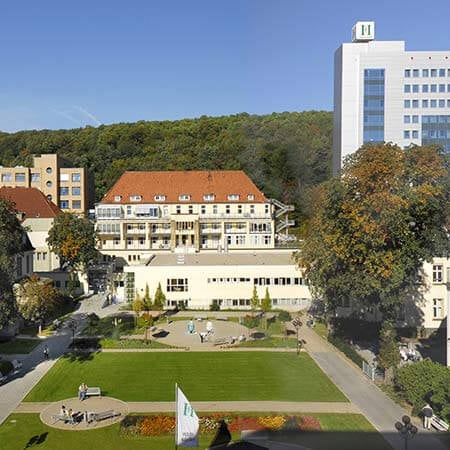Liver cancer is considered one of the most challenging malignancies to treat. Its management requires both advanced technologies and specialized expertise. This is why we want to discuss why it is so important to choose the right hospital for liver cancer treatment. We want to remind liver cancer patients, that this decision can significantly impact their survival and outcomes.
Of course, many may ask: how do we select the best liver cancer hospital in the world? Typically leading cancer care centers can offer a multidisciplinary approach 一 they combine the clinical knowledge of oncologists, surgeons, radiologists and hepatologists to create comprehensive, personalized treatment plans. Moreover, international hospitals across different countries (with advanced technology and patient support) can offer the best chances for successful treatment and a better quality of life.
Send request for treatment
Overview of Liver Cancer and Its Challenges
Liver cancer is one of the most aggressive forms of cancer. Statistical data show, that it ranks as the sixth most commonly diagnosed malignancy, and the third leading cause of cancer-related deaths worldwide. The two most prevalent types are 一 hepatocellular carcinoma (HCC) and intrahepatic cholangiocarcinoma (bile duct cancer). Specifically HCC accounts for approximately 75-85% of cases. Intrahepatic cholangiocarcinoma makes up about 10-15% respectively.
Why is liver cancer so difficult to treat? The reason is, that it can grow quietly. In fact early stages can often remain asymptomatic. Unfortunately, this can lead to late diagnosis when curative options are limited. Patients present with advanced disease, liver dysfunction or metastases which can complicate treatment strategies. In addition, many cases are linked to underlying liver conditions ( such as cirrhosis or hepatitis B and C infections) further limiting therapeutic options.
Therefore effective management of oncology liver cancer requires specialized liver cancer clinics capable of offering multidisciplinary care. Such care may include hepatology, surgical oncology, medical oncology and interventional radiology. These centers should be equipped to provide advanced imaging and accurate diagnostics. They should also offer access to innovative therapies 一 including surgical resection, liver transplantation and locoregional interventions like TACE (transarterial chemoembolization) or SIRT (selective internal radiation therapy).
What Makes a Good Hospital for Liver Cancer Treatment?
As we previously mentioned selecting one of the best liver cancer treatment centers in the world can influence treatment outcomes and long-term survival. World-class cancer hospital can offer a combination of advanced medical technologies and experienced specialists. Moreover it can provide a personalized approach to care (customized to unique medical needs).
Primary features that define a leading clinical center for liver cancer treatment include:
Multidisciplinary Tumor Boards. Collaboration between different specialists (hepatologists, oncologists, radiologists, surgeons and transplant specialists) can ensure, that each case is evaluated from multiple perspectives 一 this approach allows for the development of highly individualized treatment plans.
Advanced Therapeutic Technologies. Modern medical centers can provide advanced interventions (TACE, SIRT and Lutetium-177 radioisotope therapy). They can also offer effective options for both early and advanced-stage liver cancer.
Expertise in Minimally Invasive and Transplant Surgeries. High-volume centers usually demonstrate superior outcomes in laparoscopic liver resections and complex liver transplants.
Support for International Patients. The best hospitals can offer multilingual coordinators, medical interpreters and assistance with logistics 一 such support can make it easier for international patients to access the most effective care.
Comparison: Best Hospitals for Liver Cancer Treatment
| Rank | Hospital Name | Location | Technologies/Services |
|---|
| 1 | Asklepios Hospital Barmbek Hamburg | Germany | TACE, SIRT, transplantation |
| 2 | WEGE Clinic Bonn | Germany | Ablation procedures, radiosurgery, radiation therapy |
| 3 | University Hospital of Ludwig Maximilian University of Munich | Germany | Lutetium-177, percutaneous embolization, radiofrequency ablation, hepatectomy and liver transplantation |
Asklepios Hospital Barmbek Hamburg is one of the top hospitals for liver cancer treatment. It is known across multiple locations for its exceptional surgical and non-surgical interventions. This center can offer advanced procedures (TACE and SIRT) which allow for the provision of individualized solutions for patients with primary and metastatic liver tumors. The hospital also operates an advanced transplant program. This makes it possible to ensure comprehensive care for even the most complex cases. In addition multidisciplinary teams of specialists work closely to deliver patient-centered therapy plans focused on innovation and outcomes.
WEGE Clinic Bonn is considered among the best clinics for liver cancer. It is recognized for its advanced and minimally invasive surgical techniques (the clinic specializes in ablation procedures and radiosurgery). These strategies allow for the destruction of cancer cells with minimal impact on healthy tissue. Furthermore international patients can benefit from a fully integrated system of clinical support services. Hospital can be viewed as a leader in the field offering advanced medical technologies and holistic patient care.
University Hospital of Ludwig Maximilian University of Munich is one of the best hospitals for oncology in Germany. It can offer various innovative treatments for liver malignancies. Hospital provides access to Lutetium-177 radioisotope therapy and complex hepatobiliary surgeries. It is a major medical center for innovative cancer therapies which integrates advanced clinical research into daily practice. The hospital also has an international patient department. This helps ensure that patients from abroad can receive exceptional clinical care that meets their needs.
Comparative Table: Liver Cancer Treatments Abroad
We hope that our readers now see that modern liver cancer treatment abroad in top medical locations can offer patients access to innovative therapies, that can improve survival rates and quality of life. Compared to traditional methods advanced treatments can deliver better clinical outcomes with fewer side effects. This is why they are often preferred for international cancer care.
| Therapy Type | 2-Year Survival Rate | Response Rate | Duration | Side Effects |
|---|
| Standard Treatments | ~25% for advanced cancer | Less than 10% | Several cycles | Severe (nausea, fatigue, hair loss, immunosuppression, skin irritation) |
| Innovative Methods | ~60% for advanced cancer | 45-65% | Up to 4 sessions | Mild (localized discomfort) |
*Booking Health data
Liver Cancer Treatment Cost
Seeking liver cancer treatment abroad can vary significantly in cost, depending on the method chosen, the country and the specific locations of the clinics. Perhaps, our readers have noticed that our data suggest the best liver cancer treatment in world can be accessed in medical centers in Germany. These facilities can offer some of the most competitive prices globally (while maintaining high standards of care).
| Treatment Methods | Germany | Great Britain | USA |
|---|
| Standard Treatments | €80,000 - €150,000 full course | €90,000 - €165,000 full course | €100,000 - €180,000 full course |
| Innovative Methods | €25,000 - €60,000 full course | €70,000 - €120,000 full course | €100,000 - €150,000 full course |
*Prices may vary depending on the course of treatment and tumor characteristics
The prices noted above include diagnostics, treatment, hospital stay and post-treatment support. However certain factors can affect the final cost, including the complexity of the case, the technologies used and the length of hospital stay.
Access Liver Cancer Treatment in Germany Through Booking Health
We, at Booking Health, understand how difficult it can be to choose the right hospital for liver cancer treatment. However, we can simplify the process by assisting patients with clinic selection, handling paperwork, coordinating medical services, and providing visa support and interpreters. By working directly with hospitals under fixed contracts, Booking Health ensures transparency, cost efficiency, and logistical support, allowing patients to focus on their recovery.
Our services include:
- Assessment and analysis of medical reports.
- Development of the medical care program.
- Selection of a suitable treatment location (with multiple locations available).
- Preparation of medical documents and forwarding to a suitable clinic.
- Preparatory consultations with clinicians for the development of medical care programs.
- Professional advice during the hospital stay.
- Follow-up care after the patient returns to their native country after completing the medical care program.
- Taking care of formalities as part of the preparation for the medical care program.
- Coordination and organization of the patient's stay in a foreign country.
- Assistance with visas and tickets.
- A personal coordinator and interpreter with 24/7 support.
- Transparent budgeting with no hidden costs.
Timely diagnosis and properly coordinated liver cancer treatment abroad are essential for improving survival rates and enhancing quality of life. Access to the best hospitals for oncology can offer patients the best chance for recovery. Whether undergoing surgery, radioembolization, or innovative therapies, receiving care at a leading liver cancer center can make a significant difference.
Contact Booking Health today to begin your path to effective liver cancer treatment at one of the best hospitals in Germany.
Send request for treatment
Frequently asked questions of our patients
What are the main treatment options for liver cancer?
... Liver cancer treatment in Germany and other countries can involve a combination of surgery, TACE, SIRT6, systemic therapies and the newer Lutetium-177 radionuclide therapy. Advanced liver cancer therapy options are customized to the tumor's characteristics and clinical profile of the patient.
Can liver cancer be treated without surgery?
... Yes, many liver cancer patients can undergo non-surgical options (TACE, SIRT or Lutetium-177 therapy) depending on the stage and spread of the disease. These minimally invasive treatments are available at the best hospitals for oncology — they can effectively control tumor growth and improve survival rates.
Do hospitals in Europe offer Lutetium-177 or TACE?
... Yes. Many leading hospitals for liver cancer treatment in Europe offer Lutetium-177 targeted radionuclide therapy and TACE procedures. These innovative treatments can provide effective solutions for patients who are not candidates for surgery.
How to travel abroad for liver cancer treatment?
... To arrange liver cancer treatment abroad patients need to choose the right clinic, secure medical visas and coordinate travel logistics. Booking Health can provide comprehensive support and help international patients receive the best liver cancer treatment in the world.
What stages of liver cancer can be treated in foreign clinics?
... Foreign clinics can treat all stages of liver cancer. They can provide access to advanced liver cancer therapy and innovative technology which can offer effective treatments personalized to each patient's condition.
How can Booking Health help with organizing treatment abroad?
... Booking Health can help patients arrange liver cancer treatment abroad by managing every detail of the medical journey. We work to ensure that patients receive world-class care from the most experienced oncologists at the best hospitals for oncology.
Authors:
The article was edited by medical experts, board certified doctors Dr. Nadezhda Ivanisova and Dr. Bohdan Mykhalniuk. For the treatment of the conditions referred to in the article, you must consult a doctor; the information in the article is not intended for self-medication!
Our editorial policy, which details our commitment to accuracy and transparency, is available here. Click this link to review our policies.
Sources:
Centers for Disease Control and Prevention
Cancer Support Community
American Liver Foundation












